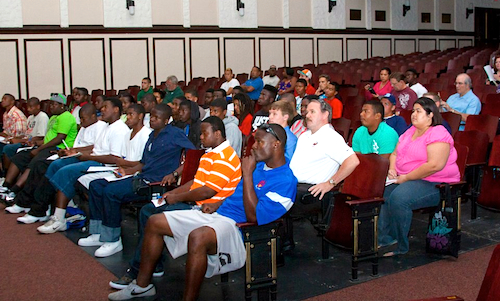Attention all high school athletes!!! There is a very important person at your school that is essential for you if you are looking to continue to play sports at a next level. This person is your guidance counselor and they are as vital to you as your coach is in becoming a college athlete. You might think that comparing the importance of a guidance counselor and a coach is crazy; however, with the frequently rising NCAA admission standards for athletes a guidance counselor is usually the only person on campus who can ensure that you are academically capable of playing college sports. Big County Preps was able to catch up with Charlie Diaz, head of the Freedom High School’s Guidance Department, and spoke with him on the importance of student athletes working with their guidance counselor’s to ensure their college eligibility.
The first thing that Charlie felt it was vital for every student athlete to know, is that by meeting high school graduation standards, you do not necessarily meet the standards required to become a NCAA student athlete. For example, the core GPA to graduate high school is a 2.0; yet, the core GPA you need to become a college athlete is a 2.3. Furthermore, 2 years of a foreign language is not a graduation requirement; however, you can kiss any chance of playing sports in college goodbye without it. A guidance counselor generally has over 200 students on their case load which is a heavy burden; therefore, student-athletes need to be proactive in meeting their counselors and telling them their intentions. Once, the counselor knows that the student is a potential college athlete they can ensure that they are enrolled in the proper classes to meet NCAA clearinghouse standards.
Students who have not met the clearinghouse standards do have options if they are able to catch the snafu early enough in the year. Programs such as credit recovery and Florida Virtual School allow students to make up classes at a rapid pace. The Eligibility Center which verifies student transcripts may no longer accept credit recovery courses that do not meet the NCAA’s new guidelines. – SEE HERE. A word of caution though, these programs are student driven and there is little face to face interaction with a teacher; hence, they can be very difficult and are usually a last resort.
Finally, for any coaches reading this article it is essential for you to work with your schools guidance staff. While Charlie was working at Hillsborough High School he was able to set up a unique program with Coach Earl Garcia. The guidance counselors at Hillsborough agreed to allow Charlie to be the case manager for the football team. Charlie traded students off his case load to other guidance counselors in order to acquire all 60 football players. This ensured that he could easily monitor their progress for Coach Garcia and make sure they were all academically eligible for the next level. It also lifted a heavy burden off the other members of the guidance staff. Maneuvering through the NCAA clearinghouse can be tricky and this relieved the other councilors of that responsibility. Charlie believes that this unique formula would be beneficial at every school and only requires a coach and guidance staff that are willing to think out-side the box.
The NCAA Clearinghouse can be tricky and it is up to everyone (Coaches, Parents, Guidance Staff, College Recruiters and the Student-Athletes) to work together to get students to meet all of its requirements. It is vital that every member of this team know the requirements that must be met to ensure the child’s future success in college athletics.
– Anthony Peace
